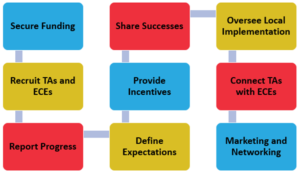NAVIGATE THBB: About | Early Childhood Education Programs | Community Partners | Contact
You are here: Home » THBB » Community Partners » Frequently Asked Questions for Community Partners
Frequently Asked Questions for Community Partners
Answers to your questions are just a click away! Click or tap one of the questions below to view an answer.
Community partner organizations, such as local health departments or other community health organizations, serve as the program administrative body and direct connection to ECEs with the program on a day-to-day basis. In this role, community partners:
The support a Community Partner will receive will depend on the agreement in place with the state leadership team. In general, a community partner will receive capacity building support, training and professional development for technical assistance consultants, and promotion and recognition materials to help support THBB efforts in their community(ies).
Community Partners are responsible for providing a local presence and funding administration of the THBB program at the local level, to include funding TA Consultant positions and position support benefits, such as travel and insurance. Community partners can offer additional incentives for participating ECEs as resources are available.
Implementing THBB in your community may seem daunting at first. To help, THBB state leaders, partner agencies that contributed to developing the program, and Community Partners who participated in piloting THBB have compiled a suggested checklist of recommended action steps. This checklist has been developed to support you in creating your plan for Texas Healthy Building Blocks implementation. This checklist is not all-inclusive but is meant to guide you in ensuring that your community is as prepared as possible to successfully implement in your community. More guidance is provided in the Community Partner Implementation Guide and the sections are highlighted here:
- Conduct a Community Needs Assessment and consider your service area, the number and type of Early Childhood Education Programs in your area, obesity rates of children in your area, availability of persons who are possible Technical Assistance Consultants and the training needs.
- Identify sources of funding to support Technical Assistance Consultants and additional optional incentives. Consider funding limitations and priorities and how long the funds will be available.
- Develop an implementation plan, which will include the target number and type of ECEs you want to serve, how to promote and encourage participation, setting clear expectations for participating ECEs, define tasks for management and technical assistance, develop a plan for data collection and identify possible stakeholders and partners.
- Consider a budget for implementation to include costs associated with conducting a needs assessment, providing technical assistance and support for ECEs, optional incentives and awards, administrative expenses, and expenses associated with marketing and outreach.
The current eligibility criteria for THBB TA Consultants is to align with current ECE training professionals that follow Texas Health and Human Services Child Care Regulations Trainer Requirements outlined in chapter §746.1317. THBB requires that TA consultants must complete BOTH Go NAPSACC TA Consultant training and the THBB TA Consultant Training in order to become an Approved THBB TA Consultants. Use the Contact Form to find out how to access the TA Consultant Training.
Each community partner is responsible for developing their own implementation plan. However, the Texas Department of Health & Human Services offers a Search Texas Child Care search engine that includes the current regulated early childhood Education programs in a particular service area, zip code, or county jurisdiction. You may have to filter the distance option to include all of the programs in a desired area. Use the download link at the top to export the list in another format.
- Reach out to the State Leadership Team by using the Contact THBB Form.
- Set up a time to meet virtually or in-person with a member of the team to figure out how THBB powered by Go NAPSACC can help your organization build capacity and help improve ECEs in your serve area.
- Review the THBB Community Partner Implementation Guide and support materials.
- Establish a Memorandum of Understanding with Texas A&M AgriLife Extension Service, who provides administrative leadership for THBB, to support the state’s Early Childhood Obesity Prevention Project.
- Start building your network and identifying who will serve as Technical Assistance Consultants.
- Stay connected with the state leadership team for guidance, training and support.
A Community Partner along with their Technical Assistance Consultants can encourage Early Childhood Education (ECE) Programs to prioritize certain modules over others based on the level of support the Community Partner can offer considering funding and possible additional incentives when specific modules are completed. An ECE has the capability in the GO NAPSACC system to work on any of the modules of their choice and go through the 5 Step Improvement Process; however, if a Community Partner has funding to support specific modules, the Community Partner can encourage the ECE to start with those before moving on to others. An example of this situation is if funding has been secured to promote agriculture in early childhood programs, then the Community Partner can encourage the ECE to begin with the Farm-to-ECE module.
An organization or department within an organization or agency who is willing to administer technical assistance for the Texas Healthy Building Blocks Recognition Program which is powered by the Go NAPSACC online system. A formal memorandum of understanding will be established with THBB state leadership team, specifically the agency providing administrative support, Texas A&M AgriLife Extension Service. A Community Partner can be a public health, education, or community focused organization willing to support the state’s initiative to prevent early childhood obesity in their designated service area and collaborate with other Community Partners, if present.

